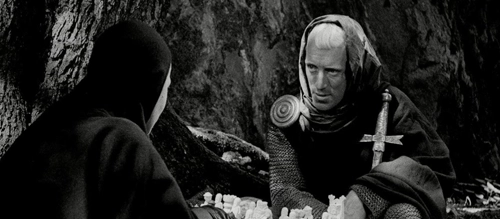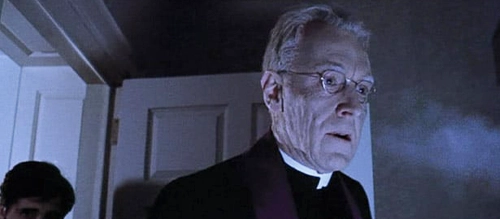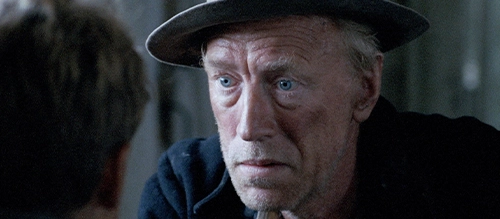Max von Sydow: 3 Career-Defining Performances
There are some figures that appear in legend. The actor’s actor. The Shakespearean ilk are certainly of that breed, with individuals such as Laurence Olivier and Charles Laughton delivering peak performances regardless of their age, or the production they’re in. Max von Sydow, the giant of Swedish cinema, is one of those actors that has come to be regarded in the same breath. Any time he turns up, no matter for how long or short, the world is instantly brightened and the world of the arts is infinitely enriched.
Born in Lund, Sweden, in 1929, to a Swedish father and a French mother, Carl Adolf von Sydow became interested in acting after seeing a performance of “A Midsummer Night’s Dream” on a trip to Malmo. During his two-year stint in the army, he took on the name Max after the star performer of a flea circus he witnessed. Starting up multiple amateur dramatic societies and groups throughout his early years, he eventually enrolled at Stockholm’s Royal Dramatic Theatre to gain his early acting chops.
He got his start in cinema in the films of Alf Sjöberg in the early 1950s, mixing his time there with continued work in theatre. This combination of skills would stand him in good stead for the decades to come. In time, he would come to work with Steven Spielberg in Minority Report, with Martin Scorsese in Shutter Island, and would appear in Star Wars: The Force Awakens (despite being well into his eighties). He picked up numerous Academy Award, Golden Globe, and BAFTA nominations throughout his career, and although he sadly passed away in March 2020, he is still regarded as one of the all-time greats; one that anyone would have given anything to work with even once.
Amidst all of these incredible performances, three must be chosen to show off Max von Sydow’s wide range of skills, talents, and iconic moments. So here they are, for your reading pleasure.
1. The Seventh Seal (1957)

When all is said and done, it is Max von Sydow’s partnership with Swedish legend Ingmar Bergman that will be best remembered. The two of them teamed up for a total of eleven films, including classics such as Wild Strawberries and Through A Glass Darkly. The combination that will be regarded as their all-time masterpiece, however, must be The Seventh Seal.
In this film, von Sydow plays the stoic medieval knight Antonious Block, who travels across the land dogged by Death, who has come for him. He challenges Death to a game of chess, travelling as he plays. When Death beats him, he’ll give up the ghost, but as long as the game goes on, he’s OK.
The Seventh Seal is a tapestry of vignettes encompassing all possible emotions. Some moments are funny, some terrifying, some deeply philosophical and introspective. Throughout it all is Max von Sydow, stoic and immovable, constantly wrestling with theology and existential dread on the inside and attempting to remain calm on the outside. His arc throughout the film is one of the great journeys of Swedish cinema, if not all of film, twisting and turning and facing life and death with his dogged determination to both defeat death and find a reason for doing so. It is because Block is so human that he is so endearing and powerful as a cinematic figure, and von Sydow portrays him perfectly.
Ingmar Bergman was the mastermind behind The Seventh Seal, but without Max von Sydow leading us through the story with his performance, it wouldn’t strike with the piercing accuracy that it does.
2. The Exorcist (1973)

If Max von Sydow is remembered for a single role in English-speaking cinema, it will be for his titular, yet relatively minimal role, of Father Merrin in the eternally influential adaptation of William Peter Blatty’s 1971 novel. The Exorcist became the first horror film to be nominated for Best Picture, was the highest grossing R-rated horror film for decades, and allowed Max von Sydow to become one of the only actors in the world to be better known for his back (in silhouette under a streetlamp on the poster) than his actual face.
Despite the film being named for Father Merrin, the titular exorcist, it is only in the final act that he arrives on the scene to do battle with the demon Pazuzu (aside from the opening scene). The rest of the film has been focused on Jason Miller’s Father Karras and Ellen Burstyn’s Chris MacNeil, and realistically, despite Merrin being called to exorcise the demon, it is Karras who is the true exorcist of the story. When Max von Sydow does happen to enter the picture, boy does he step the whole film up a notch.
What has already been an incredible film is given gravitas and weight in his quiet, kindly demeanour. Robed up, he is ready for an all-out war of good vs evil. Side by side with Jason Miller’s Karras, splashing water on Linda Blair’s Regan as she hovers in the air above her bed, clouds of cool breath spewing from their lips, the battle is immortalised, and it would be completely different without von Sydow’s expertise. Nobody else could have done this role the justice Max von Sydow did.
Recommended for you: The Exorcist Movies Ranked
3. Pelle the Conqueror (1987)

By 1987, Max von Sydow needed no introduction. He was both a national and international star. Yet it took until 1987 for the Academy Awards to give him his first nomination. The film he would be nominated for, Pelle the Conqueror, adapted by Bille August from the 1910 novel by Martin Anderson Nexø, won the Palme D’Or at Cannes, and would win the Oscar for Best Foreign Language Film. Despite its many wonderful qualities, critics almost universally singled out von Sydow’s performance as the highlight of the film.
Bringing his young son, Pelle (played by Pelle Hvenegaard, ironically named after the character from the novel he would eventually play), to Denmark in the 1850s, von Sydow’s Lasse Karlsson ends up as a farmhand trying to make ends meet. The film follows Pelle as he grows through rural life under the thumb of the farm owner, getting into scrapes, learning to read and to stand up for himself and his beliefs, and eventually striking out on his own to escape such a harsh life.
It is a wonderfully emotive, if sometimes melodramatic and slow, piece of cinema, which makes full use of Hvenegaard’s youthful talent and von Sydow’s gentle weariness. However Pelle moves or grows throughout the film, the piece always returns him to Lasse trying his best, teaching his son the values he hopes he will one day use for his own fortune. In the performance there is Antonius Block’s determination and grit, this just lurking behind Father Merrin’s gentleness and wish for goodness in the innocent, and the film plays to these qualities beautifully.
Recommended for you: Other Career-Defining Performances Articles
Other roles of his might be better known, and the films might be more often seen, but Pelle the Conqueror shows all of Max von Sydow’s strengths as one of the greatest actors of his time. Gone but never forgotten, this film, along with The Seventh Seal and The Exorcist, illustrate why Max von Sydow was one of the all-stars, defying all the odds and growing into a Hollywood treasure from a Swedish independent thespian, through sheer determination and endurable talent.

